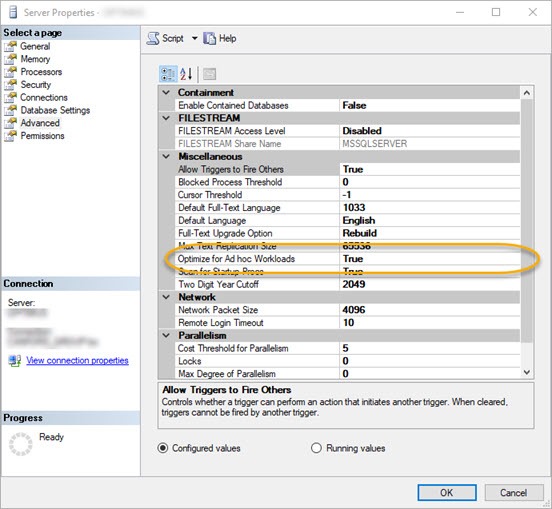SQL server Optimize for Ad hoc Workloads setting in server advanced properties window
TL;DR Turn this option on, from false to true
Whilst looking at a problem SQL server instance, I was on the diagnostic journey looking at why the query plan cache was getting totally cleared every few minutes. It turned out the server had bad memory setup and SQL server was suffering some bad memory pressure. However I did learn about a setting that I find hard to think of a reason why you’d not want to use it in a typical (what install is typical tim?) setup. This option Optimize for Ad hoc Workloads tells SQL server to not cache the query plan for a query until it sees it twice.
This is important where the SQL query work load is very varied, particularly where ad-hoc, non-stored procedure queries are being ran as they can bloat the query cache. The query cache is used to store the compiled execution plan required to execute a particular query. When a new query is encountered, the plan is calculated and put in the cache to save having to compute the plan again, if the query is seen again. The problem is that with ad-hoc queries they are unlikely to be seen again, thus SQL server is using up memory unnecessarily that could be used for better things.
I understand, but need to verify, that this is also true of ORMs such as Entity framework, that although it does create parameter based SQL to execute, in the SQL it sends to the server, the length of those parameters can vary depending upon the length of the values in those parameters. Thus this can create a large number of query plans for what are essentially very similar queries. (OK technically the length of the searched text can vary the query plan but run with this).
The setting will greatly reduce the number of plans and memory used for them on the server as only if they the query is seen twice will it be fully cached. The first time it is seen a stub is created that is enough to spot if the query is seen a second time, only then will the query plan be cached. Truely ad-hoc queries wont be seen again and space in the cache is saved. The compile time is not really worth worrying about because having to compile the query twice is no big deal as after the second compile, the further 100,000k executions can come from the cache, so proportionally its an efficiency worth having for a tiny, tiny hit of compiling the query plan twice.
There is a good article here on how start looking into if you have bloat,
http://www.sqlservercentral.com/articles/SQLServerCentral/91250/
There is a similar setting of Forced Paramatization for details of this setting see this post by Brent Ozar, https://www.brentozar.com/archive/2018/03/why-multiple-plans-for-one-query-are-bad/ basically this setting forces the server to look more carefully at the plans and infer where parameters would exist if you were to paramatize the query. This is great for reducing plans in the cache but increases processor work as it has to examine queries a lot more to work out where the parameters lie. It can also lead to bad parameter sniffing as before the plans would have been totally bespoke, now they will be shared and the exact parameter can change the optimal plan.

